So you want to be a writer. Fantastic! But have you thought it through? Do you know what it really takes to be a writer? You might think you do, but if you’re only looking through rose-colored glasses at the glamour of being a famous author, you may be shocked to find some ugly bumps in the road. Writing is full of harsh reality checks, and if you’re not prepared for what lies ahead, those cold hard truths can tear you to shreds faster than you can say “unfinished manuscript”.
So before you head out on your grand writing journey, here are six hard truths about being a writer you should really be aware of. Proceed at your own discretion!
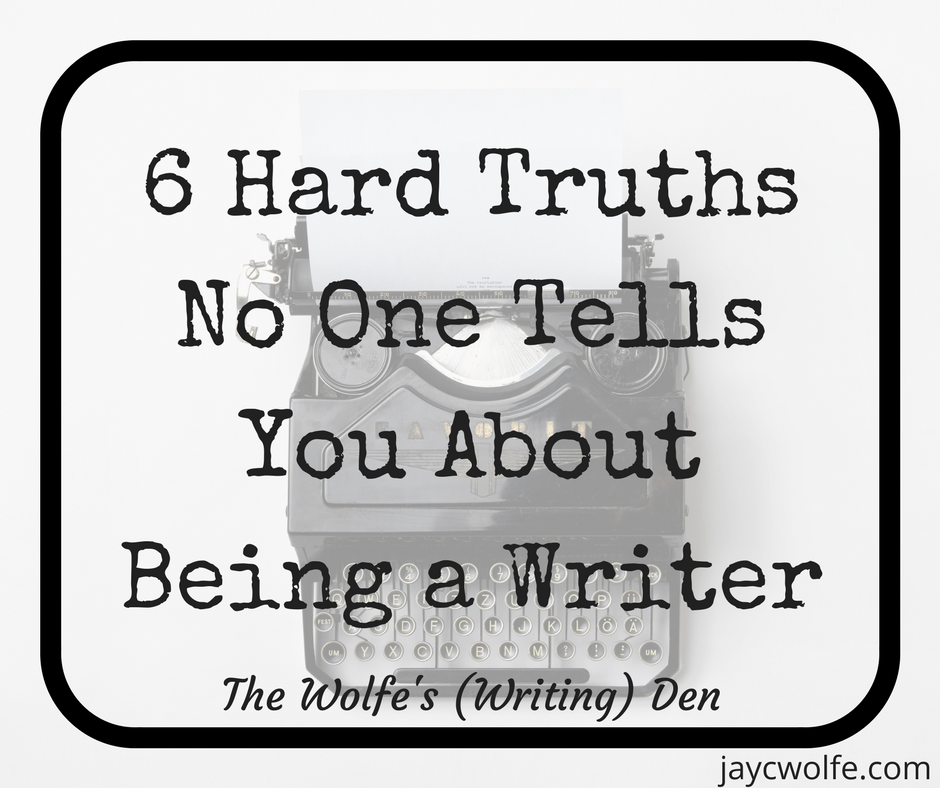
Hard Truth #1: Writing is not as easy as you think it is.
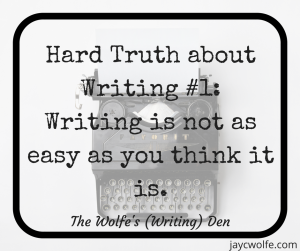 If you’re thinking about pursuing writing because it’s an easy way to make a living right off the bat, then stop right there. Turn around and go back, because this is not the calling for you. Or if you insist, proceed and find out the hard way: writing is not as easy as you think. In fact, some would go as far as to say writing is one of the hardest things in the world to do. Tons of hard work for relatively little reward? Nothing easy about that.
If you’re thinking about pursuing writing because it’s an easy way to make a living right off the bat, then stop right there. Turn around and go back, because this is not the calling for you. Or if you insist, proceed and find out the hard way: writing is not as easy as you think. In fact, some would go as far as to say writing is one of the hardest things in the world to do. Tons of hard work for relatively little reward? Nothing easy about that.
Let me be clear about something: writing itself is easy. It’s hardly a skill; I mean, we learned how to do it in preschool. What’s hard is writing well. If being good at writing were easy, everyone would be making a living from it. Or maybe no one would because everyone could do it for themselves. Either way, a world where everyone’s a writer would be vastly different than the world of “aspiring artists” we know today.
Everyone starts somewhere, and more often than not, “somewhere” is not very good. What separates the wannabes and amateurs from the serious writers is a commitment to mastering the craft. The amateurs will give up at the first sign of adversity: a lack of inspiration, difficulty editing, a polite yet stern rejection letter. The serious writers, on the other hand, will tackle those challenges and use them as motivation to improve. You can’t appreciate inspiration until you’ve faced hours of writer’s block, you can’t know how to self-edit until you’ve practiced enough times to learn what works, and you can’t find publishing success unless you keep pitching your work to people who might give you a chance.
If you go into the world of writing thinking it’ll be easy, then you’d better brace yourself for a lot of slaps in the face. The writing journey is a marathon, not a sprint. Approach it with respect, and you’ll find that while it may not get much easier over time, it will be much more rewarding in the end.
Hard Truth #2: Writing is not for everyone.
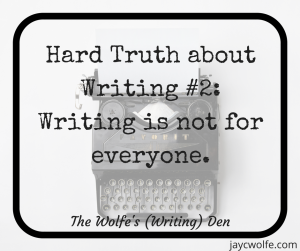 After dispelling the first myth about writing being easy, you may still want to pursue it for the sheer love of the craft. There’s nothing wrong with that; after all, a journey to becoming a writer should start with passion. But there’s more to being a writer than just writing.
After dispelling the first myth about writing being easy, you may still want to pursue it for the sheer love of the craft. There’s nothing wrong with that; after all, a journey to becoming a writer should start with passion. But there’s more to being a writer than just writing.
You might think that you don’t need to worry about editing or publishing or marketing because those jobs can all be handed off to someone else. Editing is what editors are paid for. Publishing and marketing can be handled by big publishing houses. All you have to do is write, and others will take care of the rest.
Yet in today’s world, where everyone is screaming over each other for attention, writers must be so much more. Writers must also be editors and marketers and, in the case of “indies”, even publishers. You will have to edit your own manuscript before you send it to a professional editor, and again after you get it back (expect to repeat this process several times). You will either have to convince an agent or a publisher to sell your book or make the decision to publish it yourself. You will have to do much of the marketing for your own book, regardless of which publishing route you take. And you will have to accept feedback when people actually read it, both good and bad.
So if you’re not prepared to put in all the hard work, to endure long periods of writer’s block and loneliness, edit and re-edit, power through rejections or self-publishing, and deal with criticism from readers, you might as well stop right here, because you clearly don’t have what it takes to be a writer. Well, not a published one, anyway.
This doesn’t mean you should give up writing forever; just maybe keep practicing in private until you can fully commit to becoming an author. When you’re ready to share your stories with the world, the world will be ready to read them. Until then, writing (publicly) is probably not for you.
Hard Truth #3: Inspiration doesn’t strike whenever you want it to.
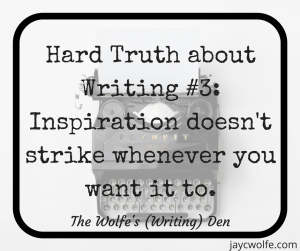 We all like to imagine artists as eccentric people in constant connection with the muses. Beauty is in everything, and even the most mundane details can be turned into a work of art in the mind of a creative person. Inspiration is anywhere and everywhere; you just have to know where to find it.
We all like to imagine artists as eccentric people in constant connection with the muses. Beauty is in everything, and even the most mundane details can be turned into a work of art in the mind of a creative person. Inspiration is anywhere and everywhere; you just have to know where to find it.
If this is your vision of writing, then prepare yourself for a world of disappointment. Much like money, inspiration doesn’t just grow on trees or fall out of the sky when you least expect it; you have to work hard to get it. The muses can be generous, but they’re also elusive. Sure, there will be plenty of times when inspiration strikes without warning, but most of the time, you will have to look for it yourself.
One of the hardest lessons you’ll learn about writing is that if you sit around waiting to write only when inspiration strikes you, you’ll never get any writing done. Many people assume that you have to get inspired to write, but believe it or not, it’s almost always the other way around: you have to write to get inspired.
Make time to create, even when you don’t feel like it. Put pen to paper or fingers to keys and start spilling words onto the page. If you don’t know where to start, use writing prompts, try writing exercises, or scribble random ideas in your notebook until something sticks. Just don’t be idle. Admit this to yourself once and for all: waiting for inspiration is nothing but a lame excuse to procrastinate. Stop waiting to be creative and just write already!
Hard Truth #4: Thick skin only comes with experience.
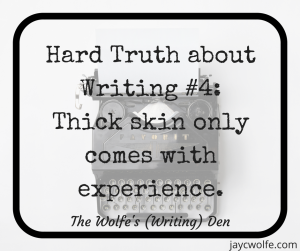 Picture this: You’ve finally published that novel you’ve been working on for years. You’ve done everything you could to make it perfect; now you sit back and wait for the praise to start rolling in. And for a while, it does: first from friends and family, then from total strangers! Everyone is liking your book! You’re a success! But just when you finally start to shed that crippling self-doubt…
Picture this: You’ve finally published that novel you’ve been working on for years. You’ve done everything you could to make it perfect; now you sit back and wait for the praise to start rolling in. And for a while, it does: first from friends and family, then from total strangers! Everyone is liking your book! You’re a success! But just when you finally start to shed that crippling self-doubt…
Gasp! What’s this? A bad review? Someone didn’t like your story! You’ve failed! All that doubt comes flooding back tenfold. And that’s why you’re now a tearstained mess, curled up on your bedroom floor and drowning yourself in chocolate for the third day in a row. Maybe you were never cut out for this writing stuff after all.
We see this advice in every publishing resource out there: if you want to be a writer, you have to have thick skin. But nobody tells you that thick skin isn’t something you magically get just because you wish for it. For most of us, the only way to learn how to brush off criticism is through brutal firsthand experience.
While it’s true that many people can dive headfirst into a profession without ever caring what people think, thick skin is especially hard for writers to develop because writing by nature requires vulnerability. As artists, we bear our souls on the page and show our emotions through our work, so when that work isn’t well received, we can’t help but take it personally. And why wouldn’t we? Our stories are our babies, and no one likes being told their baby is ugly!
No matter how much time you spend mentally preparing for bad reviews, your first one will probably hit you like a ton of bricks. Why? Because deep down, there’s a part of you that wants to believe it will never happen to you. Our fragile egos will us to believe that even though everyone has different tastes and opinions, somehow our work will be the exception that’s universally praised. And that kind of thinking is just as unrealistic as any fantasy story you’ve ever read.
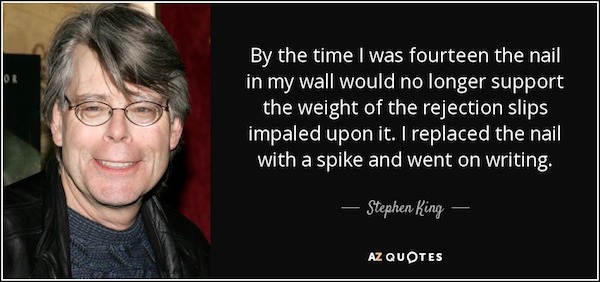
The truth is no one—and I mean literally no one—is immune to criticism. Every author gets a bad review at some point; it comes with being published. J.K. Rowling still gets one-star reviews for her critically acclaimed Harry Potter series. Stephen King, world-famous author of over two hundred stories, has too many critics to count. Margaret Atwood, Ernest Hemingway, F. Scott Fitzgerald, and Harper Lee all got scathing reviews for their classic novels when they first came out. And yet general consensus says they’re all great writers.
So don’t stress yourself out anticipating your first bad review. Instead, accept that it will come someday, tell yourself it’s okay to be upset when it does, and give yourself as much time and space as you need to move on from it. And above all, no matter how hard it seems in the moment, do not give up on writing. I promise the longer you stick with it, the easier it will get.
Hard Truth #5: Talent isn’t everything. Relationships are.
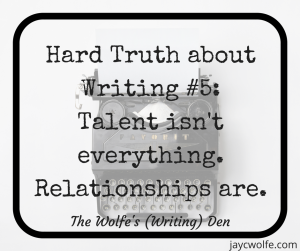 Have you ever read a well-known piece of writing—a novel, a short story, a poem—that was truly awful? Chances are you thought you could do way better. Maybe you can. Maybe you do. And maybe someday you’ll wonder why your name doesn’t appear next to those authors on the bestseller lists. Why should you have to struggle to be noticed while these writers get to enjoy fame they don’t deserve?
Have you ever read a well-known piece of writing—a novel, a short story, a poem—that was truly awful? Chances are you thought you could do way better. Maybe you can. Maybe you do. And maybe someday you’ll wonder why your name doesn’t appear next to those authors on the bestseller lists. Why should you have to struggle to be noticed while these writers get to enjoy fame they don’t deserve?
Because talent isn’t everything. That’s right, even in the world of art. Face it, even if you are extremely talented, so are thousands of other people who nobody knows or cares about. You may not be the only one reading this and thinking that your stories deserve more attention than such train wrecks as Twilight and Fifty Shades of Grey. So what makes all those terrible authors better than you? They have connections to the right people.
It takes a lot more than just being good at something to be rewarded for it. You have to know how to get your work out there, and that means building solid relationships and networks with people who can help you move forward. You need friendships with other writers who have been through the same struggles and can help you improve your writing. You need connections with editors who can polish your work and help you get it published. You need an audience of fans who will be the first to read your stories and spread the word to more potential readers.
Despite what you may think, writing is not a completely solitary endeavor. It’s more often who you know than what you know that matters. So never underestimate the power of networking, because the right person with the right connections could be the final piece of the puzzle to make your success. If you really want to be a writer, create more than stories; create meaningful, lasting relationships.
Hard Truth #6: No one chooses to write. Writing chooses you.
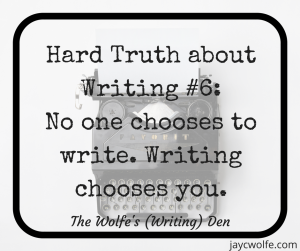 In Soviet Russia, book writes you! (You know I had to do it.)
In Soviet Russia, book writes you! (You know I had to do it.)
After learning all these hard truths about being a writer, you might be feeling a bit discouraged. Maybe you’ve changed your mind about writing and you’re already thinking about all the other skills you can put to good use instead. If that’s the case, then I’m sorry to say you were probably never meant to be a writer in the first place. But if you’ve made it to the end of this blog post and are more determined than ever to be a writer, then congratulations: writing has chosen you!
The funny thing about being a writer is that there isn’t always rhyme or reason to pursuing the craft. We write because we have to. I can’t tell you how many times I’ve looked back on old stories and blog posts I’ve written and thought, “Wow, this really sucks. Why did I write this?” And then I remember, “Oh right, because I couldn’t not write it.” This is our reality: when an idea calls, we must answer.
It’s easy enough to say you want to write your whole life, but talk is cheap. Only by doing it can you truly call yourself a writer. And if all the hard truths and fears and roadblocks of writing can’t deter you from actually sitting down and churning out those stories, then the writing life may be for you after all. So what are you waiting for? Stop reading this and get writing!
Have you learned any of these truths about writing the hard way? What other hard truths would you add to this list?


Writing’s definitely a difficult calling =) but I’d argue it can also be one of the most rewarding! All those connections you’re talking about are amazing to see when you start reaching out to people.
So true! I was terrified of the idea of networking when I first started sharing my writing publicly, but it’s been great to meet so many fellow writers and readers! Thanks for reading! 🙂